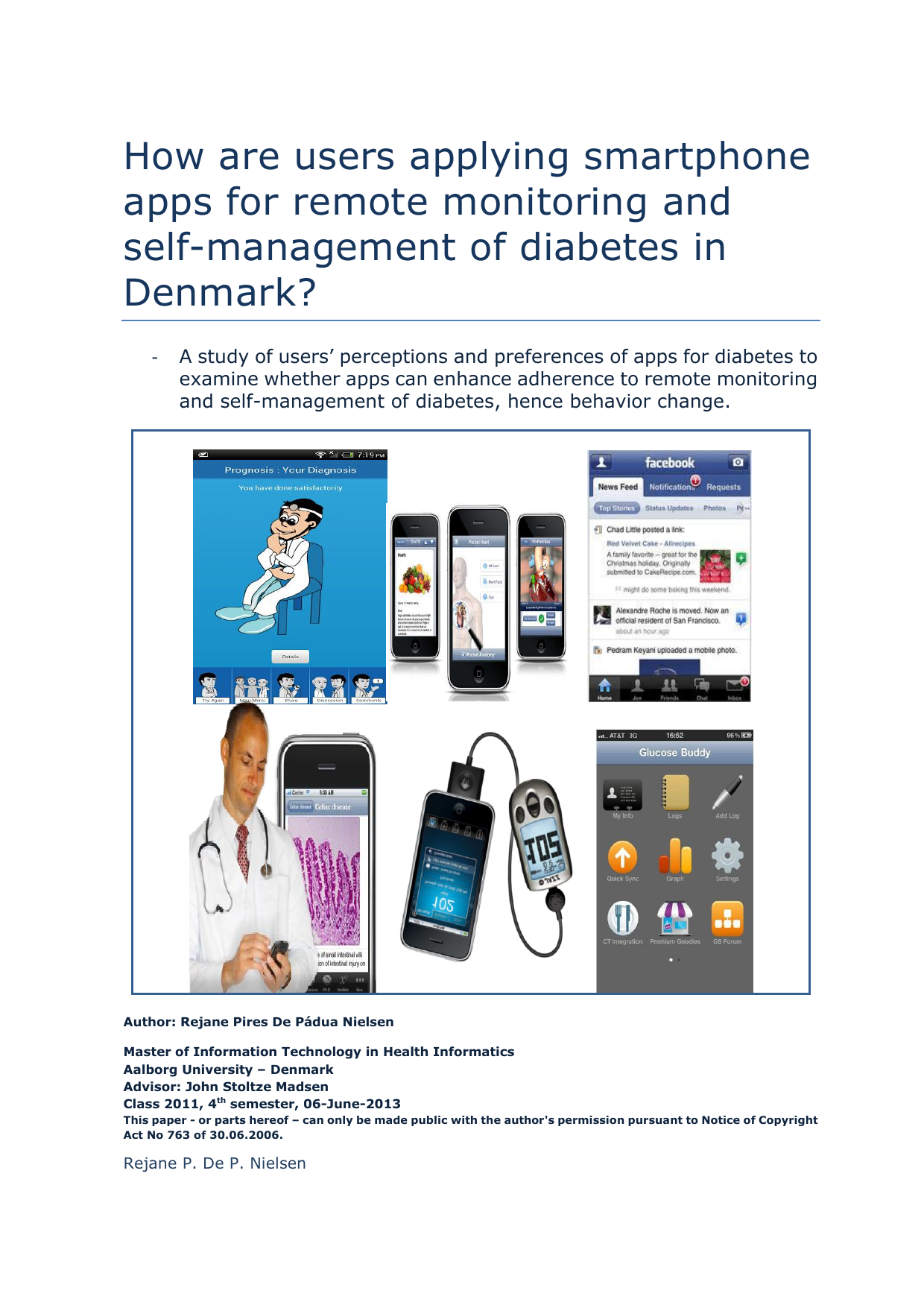
How are users applying smartphone apps for remote monitoring og self-management of diabetes in Denmark?: A study of users' perceptions and preferences of apps for diabetes to examine whether apps can enhance adherence to remote monitoring and self-management of diabetes, hence behavior change.
Translated title
Hvordan anvender brugerne smartphone apps til fjernmonitorering og selv-kontrol af diabetes i Danmark?: En undersøgelse af brugernes opfattelse af og præferencer om apps til diabetes for at undersøge, om apps kan øge overholdelse af fjernmonitorering og selv-kontrol af diabetes, og derfor adfærdsændring.
Term
2 year
Publication year
2013
Submitted on
2013-06-05
Pages
103
Abstract
Mål: Målet for denne projekt var at se på, hvordan brugerne i Danmark opfatter smartphone app-teknologien, deres præferencer med hensyn til funktioner og værktøjer for hjemmemonitorering og egenomsorg af diabetes kontrol, hvorvidt teknologien kan øge overholdelse af hjemmemonitorering af diabetes og fremme adfærdsændring for at forbedre livsstil. Jeg kiggede også på de sundhedsprofessionelles mening om teknologien. Metoder: De empirik data var sammensat af et spørgeskema og en skriftlig struktureret interview. I spørgeskemaet og i interviewet, blev respondenterne præsenteret med spørgsmål vedrørende funktioner og værktøjer i teknologien, spørgsmål relateret til forholdet mellem patient og sundhedsprofessionelle, etiske, juridiske - herunder sikkerhedsspørgsmål, og organisatoriske spørgsmål. Resultater: De fleste af de adspurgte i spørgeskemaet er positive over teknologien, de udtrykker ønske om at engagere deres læger i deres diabetes kontrol i en kombination af digital og personlig kontakt, de er tilfredse med nogle af de funktioner og værktøjer af teknologien og utilfredse med andre. De føler sig motiveret til at ændre deres livsstil med deres læge engagement og de mener, at teknologien kan bidrage til dette. Den interviewede sundhesprofessionels mening er i overensstemmelse med brugernes forventninger. Konklusion: Det er blevet bevist, at teknologien kan øge overholdelse af monitorering og egenomsorg af diabetes, på betingelse af, at etiske, juridiske, organisatoriske og tekniske aspekter er på plads for at teknologien kan betragtes som stabilt. Der kan dog stadig være mange forskellige opfattelser af teknologi blandt de mange forskellige aktører i sundhedssektoren. Nøgleord: smartphone app teknologi, kontekst-afhængig, ubiquity, pervasive computing, hjemmemonitorering, egenomsorg, diabetesbehandling.
Aims: The aims of this research was to look at how users in Denmark perceive the smartphone app technology, their preferences with regards to features and tools of the technology for the remote monitoring and self-management of diabetes, whether the technology can enhance adherence to remote monitoring of diabetes control and promote behaviour change. I looked also to the HCPs meanings about the technology. Methods: The data sampling was composed of a survey and a written structured interview. In the survey and in the interview the respondents were presented questions related to features and tools of the technology, questions related to the relationship patient-HCP, ethical, legal – including safety and security issues, and organizational issues. Results: The majority of the respondents of the survey seem to be positive with the technology, they express the desire to engage their doctors in their diabetes control in a combination of digital and personal contact, they seem to be satisfied with some of the features and tools of the technology and dissatisfied with others. They feel motivated to change their life style with their doctor’s engagement and they believe that the technology can contribute to that. The interviewed HCP’s meanings seem to be congruent with the users’ expectations. Conclusion: It has been proved that the technology can enhance adherence to remote monitoring and self-management of diabetes, given that ethical, legal, and organizational and technical aspects are in place for the technology to be considered stable. Though, there can be many different perceptions of the technology among the many different actors across the healthcare. Key words: smartphone app technology, context-sensitivity, ubiquity, pervasive computing, remote monitoring, self-management, diabetes care.
Keywords
Documents
